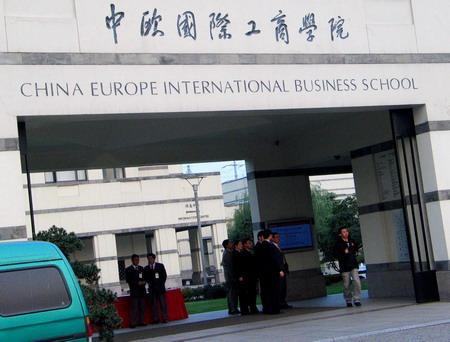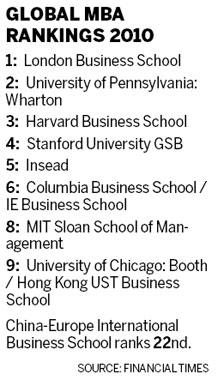
The entrance to China Europe International Business School in Shanghai. [Nan Shan / For China Daily]
Questions raised over the respective merits of Eastern and Western methods of vocational teaching
OXFORD/BEIJING - If China is to continue on its path to becoming the world's leading economy in the 21st century it will need first rate managers.
But do its business schools have the capacity to deliver the same standard of business and management education as is available in the West?
Certainly, business educational institutions such as the China Europe International Business School (CEIBS) in Shanghai, the Guanghua School of Management at Peking University, the Cheung Kong Graduate School of Business in Beijing and the Hong Kong UST Business School have made their mark.
Many of these have significant links with major world institutions and attract the best lecturers globally.
But is there sufficient strength in depth? Are the 184 business schools across the country up to the job of delivering the management expertise that China so badly needs?
Dr Eric Thun, lecturer in Chinese business studies at the Said Business School at Oxford University, said there was now a shift in the balance of power in the provision of business education from West to East.
"I think the environment has changed a lot over the last 10 to 15 years. There was an assumption you had to go to the West to learn about business but that is no longer the case. There are some absolutely top-notch programs in China. There are some business schools much more highly ranked than us in the global rankings," he said.
MBAs (Masters in Business Administration degrees) were first offered in China in a pilot program in Dalian in Liaoning province by the State University of New York at Buffalo in the 1980s.
As part of an initiative by the Ministry of Education, MBA courses were then established at 10 mainly technical and engineering colleges in 1991.
It was another three years before China's major universities began to start offering them.
Wu Changqi, associate dean and professor of strategic management at the Guanghua School of Management at Peking University, said China's shortage of management skills has been a major driver behind the growth of business schools in China.
"I think to some extent management education in the West has peaked with the numbers declining but here in China there is still a shortage of managers and that is what is driving the growth of business schools," he said.
He said potential MBA students are increasingly opting to study in China rather than go to the United States or Europe because they are worried they will get left behind in China's fast moving business world.
"If they go to America for two years with things moving so fast here they worry they might lose contact with their companies which might be sponsoring them on their courses. For them it might be advantageous to remain in China," he said.
There is certainly value for those attending business schools in Hong Kong and the mainland.
Graduates of the Hong Kong UST Business School, ranked 9th in the world in the 2010 Financial Times listing of top business schools, managed to increase their salaries by 31 percent after three years and had a 91 percent chance of employment after three months.
Similarly, graduates of CEIBS in Shanghai, ranked 22nd, increased their salaries by 33 percent after three years and the Chinese University of Hong Kong, ranked 28th, by 27 percent.
But what of the syllabuses? Are there differences in the way that MBA degrees are taught in China compared with the West?
Jiang Li is associate professor at the School of Accounting and Finance at The Hong Kong Polytechnic University.
Originally from Beijing he has experience of teaching in not only Hong Kong but at York University in Toronto, Canada, and in the Chinese mainland.
"Unlike in the US and the UK, our courses reflect the fact there are many family businesses in Asia and so there are often conflicts between family members who are shareholders in the business. We actually deviate from the standard American textbooks on these issues," he said.
Jiang said business education in China can be much more rigid with lecturers having much less freedom to deviate from the syllabuses than those at Western universities have.
"Here you are supposed to post your PowerPoint notes a week prior to your lecture. Everything is very structured," he said.
"In Canada, the professor will just walk into the lecture hall and start talking. When I was teaching investment and financial management I would just start talking about current events in the newspapers that might be relevant to the subject," he said.
"If I did that in Hong Kong the students would complain all the way to the head of the school."
According to some, business education in China is not all to do with strict adherence to syllabuses and standards.
One senior lecturer, who did not want to be named, said some Executive MBA (EMBA) courses, typically designed for senior managers, offered at some lesser institutions represented the darker side of the management education industry.
"They are basically friendship clubs where you get to know government officials also enrolled on the course. You pay your fee and you are guaranteed your degree. It has little to do with studying at all but more about networking and advancement," he said.
Xiao Zhixing, associate professor of management at CEIBS in Shanghai, which is regarded as China's leading business school, said the differences between Western and China institutions could be exaggerated.
"CEIBS is very international in the way that it does things. You wouldn't be surprised if you went to London Business School and they were teaching in exactly the same way as we are in Shanghai," he said.

He added, however, there can be a difference in the way students approach the courses.
"Western students like to think things out for themselves. Whatever the professor says they will try and interpret it in their own way. Chinese students tend to be less independent thinkers. That, in general, is the difference. They tend to follow the words of the teacher," he said.
Thun at the Said Business School, who speaks fluent Chinese and who has both studied and worked in China, agrees Chinese students tend to be less participative.
"The Americans on our courses will just talk, talk, talk, if you let them," he said indicating a yapping movement with his hand. "The students from Asia you have to draw out more. The Chinese students are excellent, however."
Li at Hong Kong Polytechnic University believes the Harvard case study approach, where students sit around discussing real life business examples, does not tend to work as well in China.
"Chinese students tend to have this view there should be a model answer whereas the point of this kind of approach is the actual analysis and discussion. There could actually be many different answers. Chinese students tend to avoid courses which make heavy use of case studies," he said.
But Thun added business education anywhere in the world now had to reflect the growing importance of China and the rest of Asia. His own role - that of a lecturer specifically in Chinese business studies - was indicative of this.
"The case I make to my students is that the advanced industrial countries had 80 percent of the share of global gross domestic product (GDP) in 2000 and 20 percent was emerging. By 2050, this is supposed to have reversed," he said.
He said this will involve the rewriting of MBA syllabuses because the economies of China and India will be fundamentally different to Western economies.
"Unlike in Japan and South Korea, which have developed very rapidly, per capita income levels will remain relatively low. As a result, if you are a German engineer and looking to increase the performance of a car, if you add too many extra bells and whistles you are going to price yourself out of the market. How we teach business will have to accommodate this."
Wu at the Guanghua School of Management said formal business education was not necessarily vital to drive the economy forward.
"The German and the Japan business education model is essentially to learn by doing the job. China, by setting up all these MBA programs, is following the US approach," he said.
"I think having an MBA qualification makes it easier for Chinese managers to work all over the world. If someone has an MBA, whether they come from Japan, China, Europe, or the US, it demonstrates you have the basic knowledge."
But he added that that did not mean there were not questions about business and management education, not just in China but in the West, too.
"There are questions being asked as well in the United States following the financial crisis. Business schools are reflecting what business programs need to be changed, " he said.





